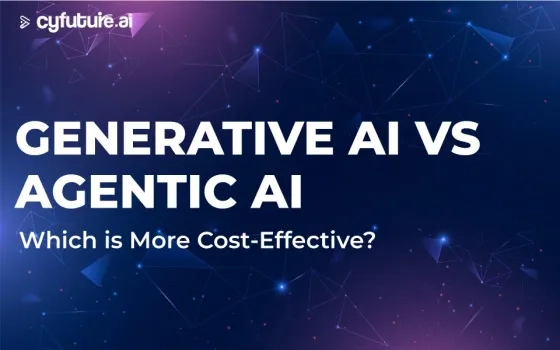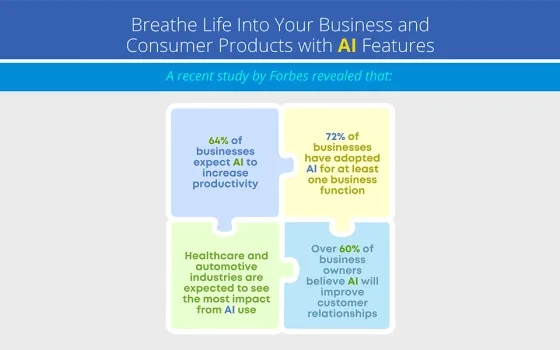Legal professionals today are moving past the skepticism surrounding AI's legal implications. They are evaluating applications of AI legal research and analysis.
These advancements have given rise to a debate about AI lawyers vs. human lawyers and whether AI can replace human intervention in law for good. A survey by LexisNexis states that lawyers see massive potential with gen AI tools to assist with researching (65%), drafting documents (56%), and document analysis (44%).
In a competitive market, leveraging cutting-edge technology, like AI in legal processes, is vital for enhanced productivity, efficiency, and cost reduction. AI transforms legal research and processes, assisting in due diligence, compliance checks, and analyzing historical data for insights. It shapes strategies, manages client expectations, and enhances accuracy and speed in law practice.
However, incorporating AI in legal research poses challenges, notably safeguarding client data and ensuring confidentiality for law organizations.
But here we have a catch-22 situation: the effectiveness of AI legal research relies on coherent data input. Thus, ensuring robust data security becomes paramount for law firms embracing AI tools in research and analysis.
In this blog, we explore the limitations of traditional research methods, use cases, and the benefits and challenges of employing AI for legal research and analysis.
Understanding Legal Research with AI
The legal domain has observed a promising shift with subfields of Artificial Intelligence like Natural Language Processing (NLP), Machine Learning (ML), and AI-powered search engines. These technologies offer more productivity when used proactively than traditional legal research and analysis methods.
Here are some challenges observed when attending legal research tasks the conventional way.
1. Traditional Methods of Legal Research and Analysis
Conventional legal research methods are inclined to visit law libraries, browse their way with legal encyclopedias and case reporters, and use tools to track case history while cross-referencing them manually.
Indexes and catalogs were the primary sources of reliance for researchers. They necessitated a lot of reading and interpreting legal text for analysis. It consumed ample time, offered minimal resources, was prone to outdated information, and heavily depended on the professional's research abilities.
2. Limitations of Manual Research
Manual research with legal presents various hurdles like excess time consumption and physical overload of browsing through heaps of legal materials. It hinders productivity due to such comprehensive information that can overwhelm law professionals.
It also comprises the research quality due to improper research methodologies. Furthermore, this process poses inherent risks like subjectivity, bias, and inefficiency in updating and tracking changes. Another significant limitation arises with knowledge sharing and collaboration.
These widespread challenges speak volumes about introducing advanced approaches to enhance AI legal research.
How AI Revolutionizes Legal Research?
AI legal research and analysis uses many subsets, such as NLP, ML, and AI-powered search engines.
- Natural Language Processing (NLP): NLP allows AI systems to glean and scrutinize information from legal documents, streamlining document analysis.
- Machine Learning (ML): Machine learning assists with legal thinking by analyzing innumerable cases, learning trends, and predicting outcomes in similar situations. It promotes informed decision-making and devising future strategies with cases.
- AI-Powered Search Engines: AI accelerates the process of case analysis, saving time and effort for professionals by offering thorough and precise insights.
How to Use AI for Legal Research? 9 Widely Adopted Use Cases
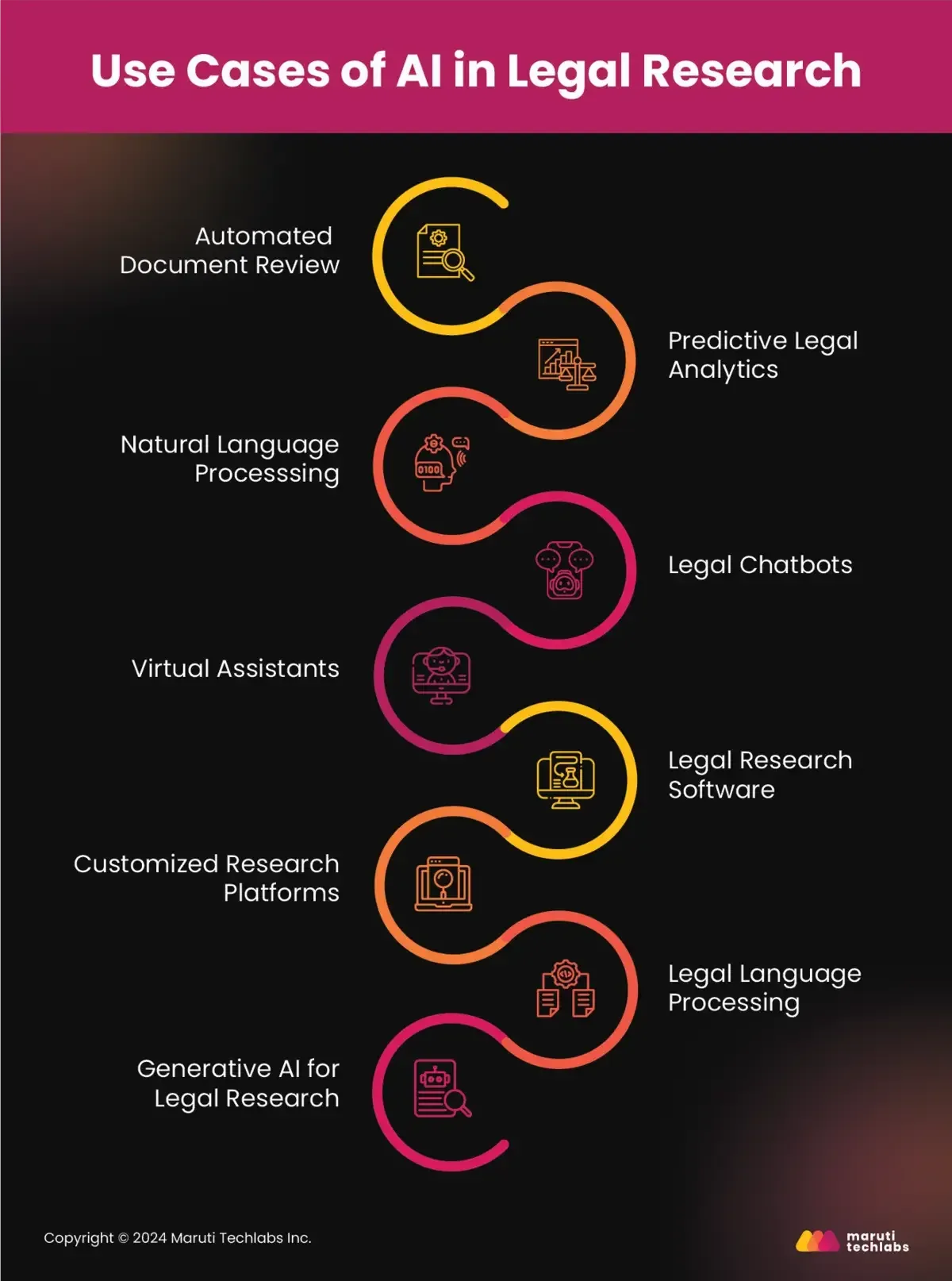
Artificial intelligence is transforming various domains, including legal research. These advancements allow law professionals to streamline legal research processes and offer better client services with informed decision-making.
Here’s a breakdown of the primary applications of AI in the realm of legal research.
1. Automated Document Review
AI-powered legal research can analyze huge collections of legal documents like case law, contracts, and statutes within minutes or seconds. These tools abstract pertinent information, learn patterns and offer content-based classification using natural language processing and machine learning algorithms.
They allow legal professionals to conduct other essential tasks that demand expertise, buying time that would otherwise be spent manually reviewing and analyzing records. Such advanced tech can also be leveraged by case management software. It assists lawyers in adhering to deadlines, automating daily tasks, and managing their case files.
Luminance is an AI Tool that automates contract analysis and generation. Matt Forsyth, Vice President and Deputy General Counsel at Idexx Laboratories, attests to the significant time savings of adopting Luminance.
He said, “This type of review would have taken us weeks to complete using a traditional CLM or manual review methods. We would have also had a low degree of confidence that every piece of essential information had been captured, since these traditional approaches can be quite unreliable. With Luminance’s AI, I have a very high degree of confidence that we identified absolutely everything of relevance among our contracts.”
2. Predictive Legal Analytics
AI can best garner insights by studying historical legal resources such as judges’ rulings, legal precedents, and case outcomes. Professionals can leverage these insights to devise future strategies, predict outcomes, and gauge risks.
A clear understanding of AI tools like ChatGPT helps legal professionals inspect the strengths of their arguments, learn relevant laws, and determine the possibility of success. This reliable foresight empowers lawyers to provide informed legal assistance, saving many resources and time.
3. Natural Language Processing
AI fused with NLP is crucial to enhancing legal research capabilities. Legal research can be time-consuming and challenging. NLP shortens this timeline significantly.
Legalese is the unique terminology used by lawyers in legal documents. Using an NLP-powered legal research engine, it's easier to browse cases and documents and translate plain language into "legalese."Other advanced NLP programs allow lawyers to find what they need, not just specific keywords, facilitating a search for concepts.
Natural language processing also assists lawyers by suggesting prior or current similar cases by studying a case study or document. These recommendations can help lawyers understand the intricacies of a case thoroughly.
4. Legal Chatbots
New clients expect prompt responses when they reach out. This requisite can be addressed using AI-powered chatbots. It eliminates the need for lawyers to sift through emails, understand the context, and reply.
They can also serve as virtual receptionists, handle routine client inquiries, and streamline the intake process. Automating these easy but time-consuming tasks allows lawyers to add more billable hours.
Furthermore, chatbots also present a competitive advantage to law firms or lawyers.
5. Virtual Assistants
AI-powered virtual assistants use ML and NLP to assist lawyers in their daily tasks. Law practitioners must categorize and organize documents, which can be tedious even with the right software when dealing with complex and high-volume cases.
Virtual assistants can offer quick results by accurately indexing and retrieving documents, reducing a lawyer’s time spent on administrative tasks.
Virtual assistants can help lawyers stay organized and focused on their core legal tasks by scheduling meetings and sending timely reminders for court dates and appointments.
Virtual assistants boost overall satisfaction and stronger attorney-client relationships by sharing case updates and addressing client concerns promptly.
6. Legal Research Software
AI-powered legal tech helps lawyers save time and effort with comprehensive research as it’s proficient with rapidly sifting through massive legal databases, learning relevant sources, and summarizing essentials.
Assistants powered with AI have an upside as they can enhance their search capabilities with increased interactions, adding more accuracy and relevance to their abilities.
7. Customized Research Platforms
The primary aim behind designing AI-powered legal research platforms is to yield personalized legal research experiences. These platforms inculcate machine learning with law, studying legal professionals’ niche research needs and preferences.
For instance, AI research platforms can imbibe a user’s browsing behavior, search queries, and feedback to classify search results, present insights, and share relevant recommendations. Such personalizations can enhance the precision and coherence of legal research, increasing the authenticity and relevance of the desired information.
8. Legal Language Processing
One of the other objectives of leveraging AI for legal purposes is to decrease the complexity of legal terms, making them more understandable and accessible. This feat is achieved using NLP algorithms that dissect legal jargon into simple forms, making legal terms understandable for non-legal individuals.
Legal professionals who must impart this knowledge and understanding to their stakeholders or clients find this extremely helpful. Legal language processing also assists with learning legal abbreviations, terminology, and acronyms, minimizing the risk of confusion with relevant legal information and increasing the accuracy of legal searches.
9. Generative AI for Legal Research
Generative AI can revolutionize legal research capabilities. Law firms depend on extensive research to prepare cases and make sound decisions. Gen AI automates browsing through statutes, precedents, and case law to present legal information rapidly.
The utilization of Gen AI expedites the research process by sharing concise summaries, underscoring crucial arguments, and forecasting potential outcomes utilizing historical data. Contract analysis and review are also areas where Gen AI plays a valuable role by spotting essential terms, risks, and discrepancies within agreements.
Gen AI fosters intelligible decision-making by flagging potential issues, determining relevant data points, and extracting significant insights for attorneys.
Benefits of AI for Legal Research and Case Analysis
Conducting research using Legal AI tools has become the need of the hour for law professionals.
Here are some notable benefits AI tools offer with legal research and case analysis.
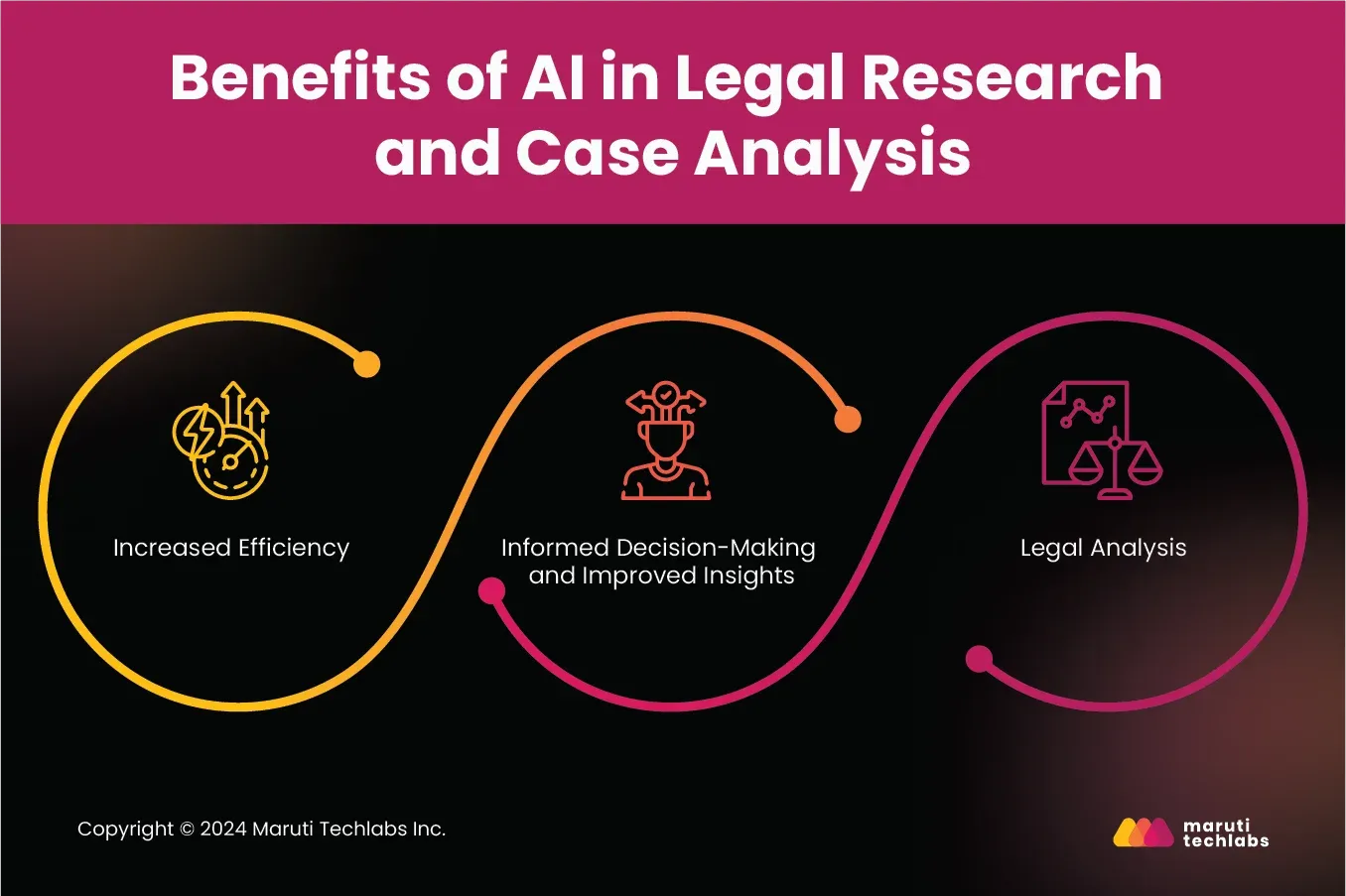
1. Increased Efficiency
AI empowers law professionals to conclude research swiftly and systematically by introducing automation with prolonged processes like legal research.
2. Informed Decision-Making and Improved Insights
AI acts as a legal Sherlock Holmes, sifting through data, unearthing hidden patterns and connections that string valuable insights for research, case forecasting, and making confident choices.
3. Legal Analysis
By crushing heaps of legal data meticulously, AI tools minimize the possibility of (human) mistakes, resulting in sharper insights in document analysis, review, and research.
Jeff Gerstl, General Counsel at Intelex, comments on the transformative impact of Kira, remarking, “Without Kira, keeping pace with legal nuances across the world is next to impossible. If we’re engaging a subcontractor located in another region, we can quickly check all of our contracts there to see if there are any data restrictions. Kira can check that in minutes, sometimes seconds.”
Challenges and Concerns of Employing AI in Legal Research
Many legal industries are adopting AI globally. From efficient information gathering to pinpointing errors accurately, AI undeniably introduces many positives to the legal sphere.
However, this change comes with specific challenges and concerns for legal professionals that should be addressed when monitoring this transition.
Let’s briefly examine what these potential hurdles can be.
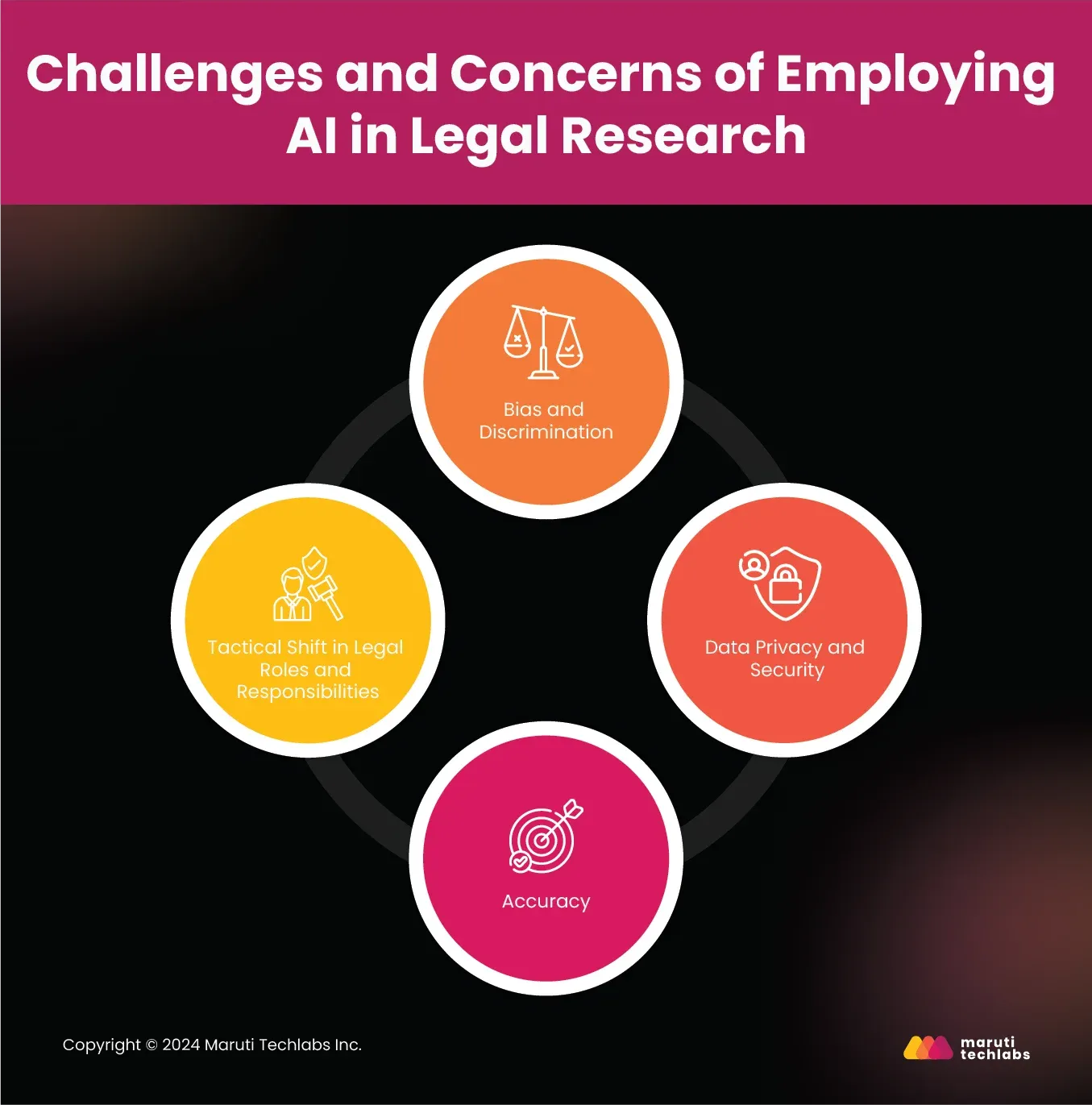
1. Bias and Discrimination
Data is the life and blood of any AI system. Therefore, the bias in any AI legal research tool results from the data it’s trained on. AI extends these discriminatory patterns, leading to unjust or dissatisfactory outcomes if the historical data used to prepare your models is compromised.
2. Data Privacy and Security
AI offers relevant results specific to your queries by learning, fetching, and relying on vast amounts of data fed into it. AI engines necessitate potentially confidential information about organizations and individuals to offer the best results.
Law professionals must incorporate robust measures to protect this information from breaches, unauthorized access, and misuse.
3. Accuracy
AI possesses a considerable downside where it generates false responses known as 'hallucinations.' AI-created content must strictly be cross-checked and validated against authentic sources by experienced law professionals to maintain the integrity of legal standards.
4. Tactical Shift in Legal Roles and Responsibilities
The rise of AI will reshape legal professionals' roles, emphasizing new skills like navigating complex workflows, risk assessment, and extracting insights from data. While organizational skills are crucial, the shift doesn't diminish the need for lawyers; instead, it signifies a change in approach.
Resources for legal tasks, including analysis and contract drafting, will change, reflecting an evolution in legal roles. Lawyers must redirect their focus from routine tasks to critical activities like devising strategies and addressing intricate legal issues. This transition highlights the positive aspects of human-AI collaboration.
Conclusion
The emergence of AI-powered legal research promises new possibilities for the justice system. Legal firms empowered with AI-powered tools and applications offer crucial enhancements to customized legal research and analysis, document review, decision-making, and language processing, promoting more accessible access to justice.
Natural language processing, machine learning, and search engines powered by AI are transforming legal research by overcoming challenges like time constraints, information overload, and resource limitations.
Key AI applications in law include automated document review, predictive legal analytics, customized legal research using NLP, virtual assistants, chatbots, and generative AI. These technologies offer improved efficiency, more profound insights through document analysis, and better-informed decision-making.
Despite these advantages, implementing AI in law introduces challenges like algorithmic bias, data privacy, accuracy concerns, and shifts in legal roles.










